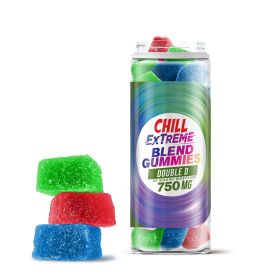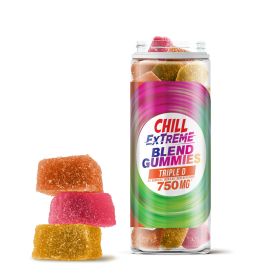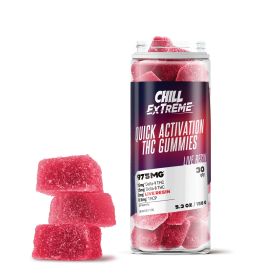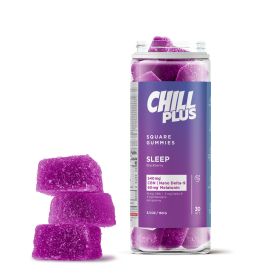Delta 9 Products
Customer Reviews
Common Questions
Delta 9 Products – The OG Cannabinoid
Delta 9 products from Chill are the classic old cannabis high with a fun (and legal) new twist.
While you may be familiar with hemp-derived compounds, such as relaxing delta 8 products, euphoric HHC products, or energizing delta 10 products, hemp-derived delta 9 is a little newer—and way more exciting.
Let’s dive a little deeper into the effects, benefits, and history of delta 9, as well as the similarities and differences between delta 9 derived from hemp and delta 9 derived from marijuana.
A Closer Look at Delta 9
Delta-9-tetrahydrocannabinol, commonly referred to as delta 9 THC or just delta 9, is a psychoactive compound found in cannabis plants that is known for producing the euphoric effects often associated with marijuana. In addition to its recreational use, Delta 9 THC has been shown to possess various beneficial properties, such as:
- Aiding in insomnia relief
- Increasing appetite
- Reducing anxiety
- Providing pain relief
That being said, according to a research study from 2017, delta 9 relieves more stress when taken in moderately lower doses, as opposed to taking higher doses which can often lead to unpleasant side effects such as anxiety, nausea, mental fog, and paranoia. To avoid these adverse effects, it’s best to start with low doses and gradually increase the dosage until the desired effects are achieved.
Finding the right dosage can be challenging and varies based on factors such as weight, tolerance, and delivery method. What works for you might not work for someone else, and what works for others might not be the best option for you.
Dosing can be tricky, especially when it comes to edibles such as delta 9 gummies, which take much longer to kick in than other methods and often lead users to believe they’ve underdosed before the gummies have a chance to take effect.
When it comes to delta 9 dosages, experts recommend dividing users into three main tolerance tiers:
|
Tolerance Tier |
Dosage |
|---|---|
|
Novices (Low Tolerance) |
5mg |
|
Casual Users (Medium Tolerance) |
15mg |
|
Frequent Users (High Tolerance) |
25mg+ |
Remember, this dosage chart is just a suggestion. Our bodies are all different, so a person who rarely smokes may find 5mg to be way too little THC, while a casual user may find themselves struggling to manage a 15mg dosage. Always begin with a lower dose than you think you can handle and give the delta 9 a chance to kick in before taking more. If an hour or two go by and you still don’t feel any psychoactive effects, feel free to take more, but avoid going overboard as it will result in discomfort.
A Short (But Complicated) History of Delta 9’s Legality
If you have a stoner friend, you’ve probably already heard about marijuana being used as medicine in ancient cultures—and it’s true! We’re not saying your stoner friend is a reliable source, but hey, when they’re right they’re right.
Humans have been using marijuana for thousands of years. Its discovery is thought to originate in Asia, from where it spread to Africa, Europe, and North and South America. But let’s focus on the history of cannabis in the United States.
While most ancient civilizations used the plant for medicinal or ritualistic purposes, the hemp plant was actually one of the first crops grown in the American colonies during the 1600s, but it wasn’t for smoking or curing illnesses, it was used for making textiles and rope.
Marijuana in the 20th Century
During the 19th and 20th century, cannabis was widely used as a patent medicine and even described in the United States Pharmacopeia in 1850. By 1937, the federal government had begun to place restrictions on cannabis use and cannabis sale under the Marihuana Tax Act.
Many experts believe that this drastic change from miracle medicine to illegal substance was a direct result of xenophobia and racism against Mexican immigrants following the Mexican Revolution. The Spanish had introduced cannabis to Mexico during colonization, and by the time the Mexican Revolution started, the plant was common for recreational use within the country’s culture.
Political and racial factors, including the Great Depression and a general disdain towards Mexican immigrants, played a role in cannabis’s banning in the United States. In fact, the name “marijuana” became heavily stigmatized in the US, causing fears and paranoia about immigrants, and by default, their cannabis habits. By 1931, 6 years before the Marihuana Tax Act of 1937, 29 states had already outlawed cannabis.
The Controlled Substances Act was signed under Richard Nixon in 1970 as part of the president’s “War on Drugs.” This act repealed the Marihuana Tax Act, elevating cannabis to a Schedule I controlled substance along with harder drugs like heroin, LSD, and others.
If you went to school in the 80s and 90s, you’re probably familiar with the D.A.R.E program, which sought to educate and prevent children from using drugs. This program painted marijuana as a “gateway” drug—a common misconception that led to even more stigma around the plant. In 1999, the Institute of Medicine issued a report stating that this was an example of correlation, but not causation. “In the sense that marijuana use typically precedes rather than follows initiation into the use of other illicit drugs, it is indeed a gateway drug. However, it does not appear to be a gateway drug to the extent that it is the cause or even that it is the most significant predictor of serious drug abuse; that is, care must be taken not to attribute cause to association.”
Even with all the heavy stigma surrounding marijuana use, its supporters and witnesses to its therapeutic powers prevailed. In 1996, California made history by becoming the first state in the US to legalize the use of marijuana for medicinal purposes. Since then, Washington D.C. and 37 other states, as well as US territories such as Guam and Puerto Rico, have also legalized the medical use of marijuana. As of 2022, 19 states, along with Washington D.C. and Guam, have gone one step further and legalized the recreational use of marijuana as well.
A New Hemp Horizon
The Farm Bill of 2018 created a legal distinction between hemp and marijuana. Both types of cannabis were separated based on their THC contents. Cannabis plants containing more than 0.3% THC on a dry weight basis are considered marijuana and are therefore still illegal under the Controlled Substances Act, but cannabis plants containing no more than 0.3% THC on a dry weight basis are considered hemp and are therefore completely federally legal.
Thanks to the Farm Bill, we can now sell completely legal delta 9 products across the country as long as they are made from hemp and not marijuana. Despite the federal government’s take on hemp, however, some states have taken on the responsibility of banning or heavily restricting hemp-derived compounds. Hemp is currently legal in 39 states but illegal or heavily restricted in 11, so be sure to check in with your state’s hemp regulations before attempting to place an order.
Marijuana-Derived Delta 9 vs. Hemp-Derived Delta 9
Some people assume that hemp-derived delta 9 is not “real” THC because it is not derived from marijuana. This notion, on a scientific level, is completely wrong. Delta 9 derived from hemp and delta 9 derived from marijuana are the exact same compound—they have the same effects, the same potency, and even the same chemistry. The only difference between the two is what plant they come from and that plant’s legal THC limit.
Hemp-derived cannabinoids are all derived from CBD, which is an abundant compound in hemp. By taking CBD and chemically converting it to delta 9, we can make real delta-9-tetrahydrocannabinol products that still have strong psychoactive effects while complying with Farm Bill regulations. Jackpot!
Delta 9 THC – One Last Take on the Iconic Cannabinoid
Legal or not, it’s no secret that delta 9 THC has become an iconic staple of cannabis culture. From ancient civilizations to modern day medicine, the compound has proven its worth for recreational and medicinal purposes.
With the recent passing of the Farm Bill, which legalized hemp-derived compounds, delta 9 THC is more easily accessible than ever before. This is 100% real, psychoactive cannabis that complies with federal regulations.
If you're looking to acquire the OG weed experience in a completely legal way, hemp-derived delta 9 is the ideal compound for you. It's relaxing, stimulating, munchies-inducing, and best of all, completely safe and legal for your enjoyment. What are you waiting for? Get busy getting buzzy today!










Try these. Quick acting and last pretty long too